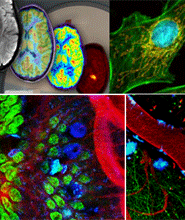The University will also invest over £1 million in this project by providing the new infrastructure to house this state-of-the-art equipment.
This new imaging facility will address the current lack of coordination in methods of evaluation between experimental and clinical stem cell research. It will also support the Bristol research team, a collaboration between the Faculties of Medicine and Dentistry and Medical and Veterinary Sciences, and their national collaborators facilitating the translation of regenerative medicine research through animal models and eventually into humans.
The in-vivo imaging equipment includes: a multi-photon microscope, a special microscope that tracks live stem cells; a combined micro positron emission and micro- computed tomography, a modern multi-functional in-vivo scan that tracks existing stem cells and small particles while imaging the damage in whole organs or in whole small animals; and a 3T magnetic resonance imaging, a modern special scan that measures in-vivo the amount of any organ damage and its impact on function and how this is affected by stem cell therapies.
The new in-vivo imaging will enable the pre-clinical team to work alongside clinical colleagues facilitating cross-collaboration.
Raimondo Ascione, Professor of Cardiac Surgery and Translational Research in the School of Clinical Sciences, who led the successful bid, said: “At Bristol we have world-class expertise in stem cell research ranging from experimental work to several world first trials in patients with cardiac, brain and muscle-skeletal severe disease.
“Performing quality in-vivo imaging scans in animal models undergoing stem cell research treatments, similar to the imaging scans done in patients, will provide key clinically relevant information on safety and effectiveness that will boost and fast-track its application in patients in the NHS.
“Importantly, it is highly possible that this approach could be of significant benefit to companion animals suffering with naturally occurring chronic disease.”
Dr Rob Buckle, Head of Regenerative Medicine at the Medical Research Council, added: “Seeing how stem cells work in real-time in animal models is a vital step toward developing safe, effective stem cell treatments for a host of currently untreatable conditions. This funding from the Medical Research Council is designed to augment the UK’s capability in stem cell research and will also enhance links between the British Heart Foundation (BHF) regenerative medicine centres and the UK Regenerative Medicine Platform.”
Thanks to the new imaging equipment the research team hope to have immediate stem cell results ready to be used to benefit patients, to improve methods of cell delivery and retention in damaged areas, to design experimental studies using the same scan-based measures used in patients, and finally, by taking repeated in-vivo imaging scans the researchers will follow-up the same animal model in the long-term therefore establishing late effects, over weeks and months, of these novel therapies.
Acquired or congenital diseases can cause marked damage in organs including the heart, muscles, bones, brain, liver and vessels, and represent a huge burden on patients’ health and NHS costs. Currently, it is possible to send patients for special scans that allow doctors to gather fine details about the type of damage and the degree of loss of function in diseased organs. It is based on the outcome of these scans that most of the treatments are introduced in patients.
